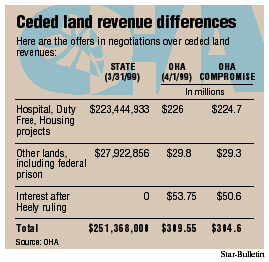

State, OHA
$53.3 million apart
on ceded land
The Office of Hawaiian Affairs
By Pat Omandam
wants $304.6 million, half now
and half in 2000, to settle
Star-BulletinThe Office of Hawaiian Affairs and the state are $53.3 million apart in a settlement over past-due revenues generated from certain areas of ceded lands, and the gap is not expected to close soon.
In an April 16 letter to state chief negotiator Sam Callejo, OHA Chairwoman Rowena Akana made a final offer to the state to pay OHA $304.6 million -- $152.3 million now and an additional $152.3 million next year -- to settle the case.
The state, however, has set the amount at $251.3 million, and is steadfast on a global settlement that also prevents OHA from suing the state again over claims involving the public land trust.
Meanwhile, Hawaiians yesterday rallied at the state Capitol yesterday against any kind of settlement legislation that would "sell them out."
"I think this pretty much demonstrates how split the Hawaiian communities are over these kinds of issues, especially this one particular issue," said Gov. Ben Cayetano.
Cayetano yesterday said negotiations have come a long way, but there's a great deal more to do before any settlement is reached. The governor said he was shocked recently by enthusiastic comments from OHA officials who said an agreement was near.
"We're just going to have to move ahead and do the best we can to resolve the differences, and when it's presented to the Legislature, if we ever get to that point, then everyone can walk in and give their opinion," he said.
Ceded lands are crown and government lands held by the Republic of Hawaii after the 1893 overthrow of the Hawaiian government. When the United States annexed the Republic of Hawaii in 1898, these lands were transferred, or "ceded," to the federal government. What are ceded lands?
When Hawaii became a U.S. territory in 1900, management of the 1.8 million acres of ceded lands was given to the territorial government. When Hawaii became a state in 1959, the federal government transferred ownership of most of the ceded lands to the state of Hawaii, creating the public land trust.
Income generated from this land trust supports five purposes. One is the betterment of the conditions of native Hawaiians.
January '97
OHA Ceded Lands RulingThe OHA letter states OHA is willing to accept 50 percent of what is owed from the four sources of ceded land income described in the 1996 Circuit Court ruling by Judge Daniel Heely.
The July 1996 ruling, known as the Heely decision, says OHA is entitled to a share of ceded land revenue from: Duty Free concession lease payments; Hilo Hospital's patient service revenues; Housing Finance and Development Corp. proceeds; Hawaii Housing Authority rental income; and interest on all these incomes.
The state appealed the decision, and the Hawaii Supreme Court has urged the parties to resolve the dispute out of court or the justices will do it for them.
To settle the case, OHA proposed the state pay $304.6 million, of which $224.7 million is based on revenue generated from these areas of ceded lands.
It also wants $27.5 million for delinquencies by the state to comply with Act 304, the law that sets OHA's ceded land revenue payments at 20 percent.
And OHA seeks $1.8 million as part of the state deal to allow the federal government to build a prison on ceded lands on Elliot Street near the airport.
The final portion $50.6 million of the $304.6 million settlement would be in interest income OHA believes it could have generated between 1997 and 1998 if it had received and invested these past-due revenues.
The state refuses to pay any interest income.

According to Akana's comments in the letter, OHA would take half the total payment upfront -- in cash or land -- and give the state a year to come up with the difference.OHA trustee Clayton Hee, when asked yesterday the status of the negotiations, said he believes the parties are very close to an agreement in terms of the calculation of the amount owed in the Heely case.
"It's my view the ship has moved away from the money aspects, and closer to other elements of the settlement that do not necessarily have a monetary impact per se, in terms of payout," said Hee, a member of OHA's negotiating team.
Akana yesterday debunked rumors leadership was "selling out Hawaiians" by supporting Senate Bill 1635, SD2, HD2, which serves as the vehicle for any proposed settlement this session.
Many who rallied at the Capitol yesterday were against the measure because they claim the bill focuses on a global settlement instead of on the Heely case.
They said its passage would lead to the demise of Hawaiian land rights and future ceded land revenues. Also, they want an inventory done of all public trust lands completed before a deal is struck.
"Additionally, the state continues to insist that OHA give up its right to seek judicial redress and obtain accountability for the trust assets," said Keali'i Gora, lieutenant governor of Ka Lahui Hawaii.
"Don't Hawaiians deserve justice?"
Akana explained OHA first wants to settle the Heely case, and then discuss a permanent agreement to future entitlements.
If and when that time comes, she said, all Hawaiians will take part in those discussions.
"The Office of Hawaiian Affairs has no intention of selecting out parcels of land and taking a deal from the state without beneficiary input," Akana said.